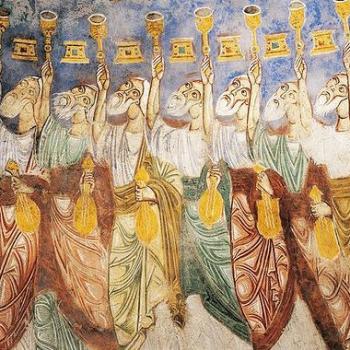Review of Oliver Crisps’ Deviant Calvinism: Broadening Reformed Theology Part One
I have invited other interested persons to join me in this series. I will post occasional (tentatively about one chapter per week) reviews and others who read the book are welcome to agree, disagree, add to, etc. I ask that those who are not reading the book with us refrain from posting comments that express agreement or disagreement; they should stick to asking questions. I will be posting about other subjects between these review posts about Crisp’s book, so if you’re not reading it—don’t go away!
So, plunging in with some thoughts about Chapter 1, “Tradition, Faith, and Doctrine.”
In this first chapter of the book Crisp does several things. He calls himself “a Reformed Catholic” and makes clear that he highly values the Great Tradition of Christian orthodoxy including the early creeds of Christendom (especially Nicea). He considers Catholics and Protestants “siblings, not enemies, related to one parent, namely, Western catholic Christendom.” (15) He also makes clear that he disagrees with Roman Catholic theology on the subject of the relationship between tradition and Scripture; he affirms sola scriptura in the sense that creeds and doctrines have only derivative authority and that Scripture alone is the “norma normans non normata—that is, the norming norm that is not normed by anything else.” (17) He uses an illustration I used in Reformed and Always Reforming: The Postconservative Approach to Evangelical Theology—American law. Legal precedents of high courts are fallible; the Constitution is not (functionally in the system of jurisprudence). And yet, legal precedents are important guides not to be ignored. So “The point is that conciliar authority, though normative under certain conditions, is nevertheless limited in its purview by the word of God, under which it stands and by means of which it can be corrected. It has normative status, but one the warrant for which is derived from a higher norm to which all conciliar canons are subordinate, namely, Holy Scripture.” (18-19)
Overall, and in general, I do not have any disagreement with Crisp’s account of the relative authorities of Scripture and tradition. He and I might disagree on what constitutes “tradition.” He seems to think, for example, that the Anglican 39 Articles of Religion and the Westminster Confession of Faith bear some kind of doctrinal authority—that they are (I’m putting this in my own words) instruments of doctrinal accountability. I would agree that they are but only for those particular ecclesiastical bodies—Anglican and Presbyterian. Well, in any case, he treats those confessional statements as if they have for him some special authority. But he makes clear their authority, whatever it is, must stand under the authority of Scripture and are open to revision if they should turn out to be in any parts inconsistent with Scripture.
I don’t see how Crisp’s account of the authorities of Scripture and tradition really differs substantially from my own and yet certain evangelicals have attacked, almost condemned, my view as leading inevitably toward liberalism in theology. Will they attack his view, too? That is to be seen. But somehow I doubt it and that because he self-identifies as Reformed and I don’t. This whole evangelical controversy (or set of controversies) is very much tribal in nature. Much depends on what tribe one is perceived as belonging to. In my experience, a person perceived as belonging to a “safe tribe” can get away with saying the very same thing a person perceived as belonging to an “unsafe tribe” (e.g., Arminian) says who is vilified for it.
Anyway, back to the main point. Crisp’s account of the religious authority seems quite traditionally evangelical to me. I have no major objection to it or even objection worthy of discussion.
After discussing Scripture and tradition Crisp moves on to “The Role of Faith.” I find these pages somewhat murky. He distinguishes between propositional or “doxatic” faith and “fiducial” faith (or these as distinct “components of faith”) and argues that both are necessary for evangelical Christianity, including Reformed Christianity, to exist fully and at its best. I can hardly disagree with that, either. The only qualm I have is that he seems to downplay any aspect of “feeling” in “Christian experience” which is a part of “fiducial” faith (trust). In other words, he affirms that authentic Christianity includes experience of God’s grace, but he includes a footnotes (9 on p. 23): “Note that here and in what follows, ‘experience’ is not equivalent to ‘feelings’.” While I agree that “experience” is not exactly equivalent to “feelings,” in that “experience” is a larger category, I do not want to dismiss feelings as irrelevant to authentic evangelical Christian faith. To be sure feelings fluctuate, but if there are no feelings of peace, joy, comfort, conviction, aspiration, hope, God’s presence, etc., I doubt that one has truly experienced all that God has to offer in regeneration and sanctification. Maybe Crisp would agree with that, but I’m not sure. He does affirm “affections” as playing a role in evangelical faith (with both Edwards and Wesley).
Most importantly, perhaps, Crisp rightly rejects any dependence of doctrinal correctness or even revelation on experience. That is, he rejects the liberal method (Schleiermacher, et al.) of regarding doctrines as nothing more than attempts to put religious feelings (God-consciousness) into speech. He argues, rightly I believe, that revelation is partly propositional and that evangelical faith cannot do without any propositional content.
Intermingled with this discussion of experience and faith is Crisp’s somewhat surprising but at the same time gratifying inclusion of both Arminianism and Calvinism under the rubric of “evangelical”—and equally—without making one somehow “more evangelical” than the other. He agrees with David Bebbington and others that (at least the modern) evangelicalism was born out of the Great Awakenings of the 1730s and that Wesley and Edwards and their faithful followers are evangelicals in the full sense. (Which is not to say he agrees with them equally!) He rightly recognizes and acknowledges that true Arminianism, together with Calvinism, affirms that “The work of salvation is entirely a work of grace; the human decision in regeneration follows in the wake of a prior (and absolutely singular) divine act.” (27)
Most gratifying is that Crisp, writing as an evangelical Reformed theologian, acknowledges that “Although there is a real disagreement about how much the will of a fallen individual awakened or invigorated by the secret working of the Holy Spirit may be said to be active in the process of salvation, this is not the same thing as claiming that the will of a fallen individual contributes in any substantive way to salvation. It is not even clear what it would mean for ‘the will’ to contribute to salvation, other than as a euphemism for the agent contributing to her or his salvation. And no evangelical theologian, Arminian or Reformed, would countenance that.” (29) That’s what I’ve been trying to say—especially to Reformed Christians—for two decades. (Crisp does include me in a footnote, so maybe I contributed to his understanding of Arminianism, but perhaps he’s one of the few Reformed theologians who already knew this about Arminianism.)
Another point of agreement I find with Crisp (at least in this chapter) is his affirmation that “Christology cannot be an afterthought in an evangelical account of divine revelation and its relation to faith and experience. It must be foundational. For Christ, as the word of God incarnate, is divine revelation incarnate.” (35) He also affirms that “divine revelation is, in a way, guaranteed…by the Spirit.” (35-36) In other words, contrary to fundamentalists and neo-fundamentalists, Crisp seems to recognize and acknowledge a hierarchy in revelation and its authority—Christ-Spirit-Scripture—while clearly and unequivocally rejecting the liberal view that subordinate Scripture to “religious experience.”
Crisp’s understanding of tradition, faith and doctrine is not substantially different from what I have argued in various writings including here on my blog—even though I doubt he will be attacked for it by those (such as Gerald McDermott) who have attacked me—as inadvertently providing a slippery slope down to doctrinal declension. We’ll see.
Here is Crisp’s final statement (before his Conclusion to this chapter): “Scripture has a final authority that no other source of creaturely testimony does (bar Christ). It is alone in that sense. But, of course, Scripture is never alone in another sense. It is always read and understood within the community of faith in a tradition stretching back to the apostles, under the guidance of the Holy Spirit.” (39)
In his Conclusion to the chapter Crisp discusses the state of evangelicalism. Here is where he and I diverge on what is possibly a minor point of perspective about evangelicalism. He seems to think evangelicalism still exist as a “coherent theological movement” even though its integrity as a movement is a cause for concern. I have given up on evangelicalism as a coherent movement. I prefer to talk about an “evangelical ethos” now that the movement is dissolved. However, perhaps surprisingly, coming from a self-avowed Reformed theologian, Crisp concludes the chapter this way: “I have argued that the two main evangelical genera that emerged from the Great Awakening, namely, Wesleyan Arminianism, and the evangelical Reformed thought of theologians like Jonathan Edwards, share enough in common concerning the notion of faith, especially faith as affective experience, for them to be considered part of one family of Christian theology that has its roots in the Reformation.” (40) I personally know (and know of) many American Calvinists who reject such an idea. They argue that Arminians and Calvinists are both historically and sociologically included in the category “evangelical,” but they deny that Arminians are theologically evangelical. Crisp seems to be saying that they are both theologically evangelical even if he happens to agree more with one than the other. This is refreshing. If all evangelical Calvinists thought and spoke this way there would be no polemic-saturated controversy, only irenic disagreement and debate (which can be very healthy).
















